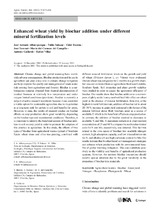Mostrar el registro sencillo del ítem
Enhanced wheat yield by biochar addition under different mineral fertilization levels
| dc.contributor.author | Salazar, Pablo | |
| dc.contributor.author | Barrón, Vidal | |
| dc.contributor.author | Torrent, J. | |
| dc.contributor.author | Campillo, María del Carmen del | |
| dc.contributor.author | Gallardo, Antonio | |
| dc.contributor.author | Villar, Rafael | |
| dc.contributor.author | Alburquerque, José Antonio | |
| dc.date.accessioned | 2017-01-19T10:29:33Z | |
| dc.date.available | 2017-01-19T10:29:33Z | |
| dc.date.issued | 2013 | |
| dc.identifier.uri | http://hdl.handle.net/10396/14337 | |
| dc.description.abstract | Climate change and global warming have worldwide adverse consequences. Biochar production and its use in agriculture can play a key role in climate change mitigation and help improve the quality and management of waste materials coming from agriculture and forestry. Biochar is a carbonaceous material obtained from thermal decomposition of residual biomass at relatively low temperature and under oxygen limited conditions (pyrolysis). Biochar is currently a subject of active research worldwide because it can constitute a viable option for sustainable agriculture due to its potential as a long-term sink for carbon in soil and benefits for crops. However, to date, the results of research studies on biochar effects on crop production show great variability, depending on the biochar type and experimental conditions. Therefore, it is important to identify the beneficial aspects of biochar addition to soil on crop yield in order to promote the adoption of this practice in agriculture. In this study, the effects of two types of biochar from agricultural wastes typical of Southern Spain: wheat straw and olive tree pruning, combined with different mineral fertilization levels on the growth and yield of wheat (Triticum durum L. cv. Vitron) were evaluated. Durum wheat was pot-grown for 2 months in a growth chamber on a soil collected from an agricultural field near Córdoba, Southern Spain. Soil properties and plant growth variables were studied in order to assess the agronomic efficiency of biochar. Our results show that biochar addition to a nutrientpoor, slightly acidic loamy sand soil had little effect on wheat yield in the absence of mineral fertilization. However, at the highest mineral fertilizer rate, addition of biochar led to about 20–30 % increase in grain yield compared with the use of the mineral fertilizer alone. Both biochars acted as a source of available P, which led to beneficial effects on crop production. In contrast, the addition of biochar resulted in decreases in available N and Mn. A maximum reduction in plant nutrient concentration of 25 and 80% compared to nonbiochar-treated soils for N and Mn, respectively, was detected. This fact was related to the own nature of biochar: low available nitrogen content, high adsorption capacity, and low mineralization rate for N; and alkaline pH and high carbonate content for Mn. Our results indicate that biochar-based soil management strategies can enhance wheat production with the environmental benefits of global warming mitigation. This can contribute positively to the viability and benefits of agricultural production systems. However, the nutrient–biochar interactions should receive special attention due to the great variability in the properties of biochar-type materials. | es_ES |
| dc.format.mimetype | application/pdf | es_ES |
| dc.language.iso | eng | es_ES |
| dc.publisher | INRA-Springer | es_ES |
| dc.rights | https://creativecommons.org/licenses/by-nc-nd/4.0/ | es_ES |
| dc.source | Agronomy and Sustainable Developement 33, 475-484 (2013) | es_ES |
| dc.subject | Agricultural wastes | es_ES |
| dc.subject | Biochar | es_ES |
| dc.subject | Grain yield | es_ES |
| dc.subject | Nitrogen | es_ES |
| dc.subject | Phosporus | es_ES |
| dc.subject | Plant growth | es_ES |
| dc.subject | Wheat | es_ES |
| dc.title | Enhanced wheat yield by biochar addition under different mineral fertilization levels | es_ES |
| dc.type | info:eu-repo/semantics/article | es_ES |
| dc.relation.publisherversion | DOI 10.1007/s13593-012-0128-3 | es_ES |
| dc.relation.projectID | IPT-440000-2010-8 | es_ES |
| dc.rights.accessRights | info:eu-repo/semantics/openAccess | es_ES |

